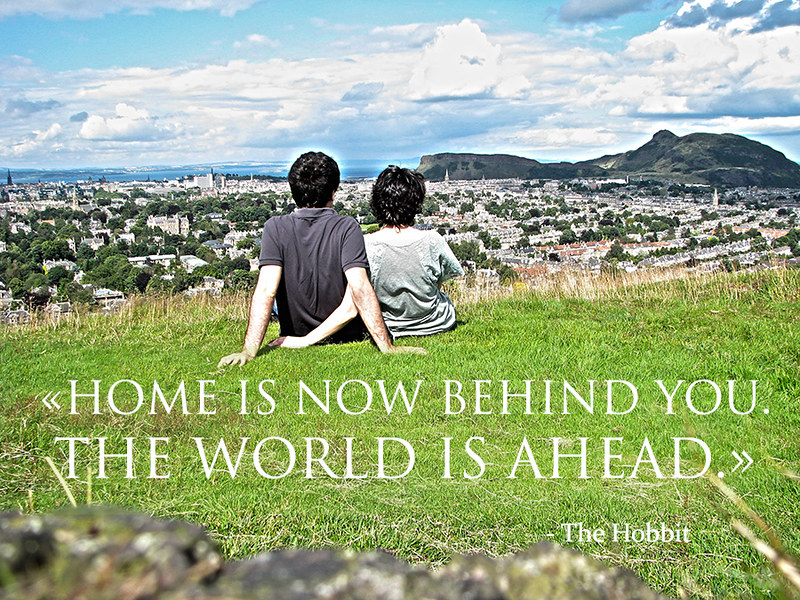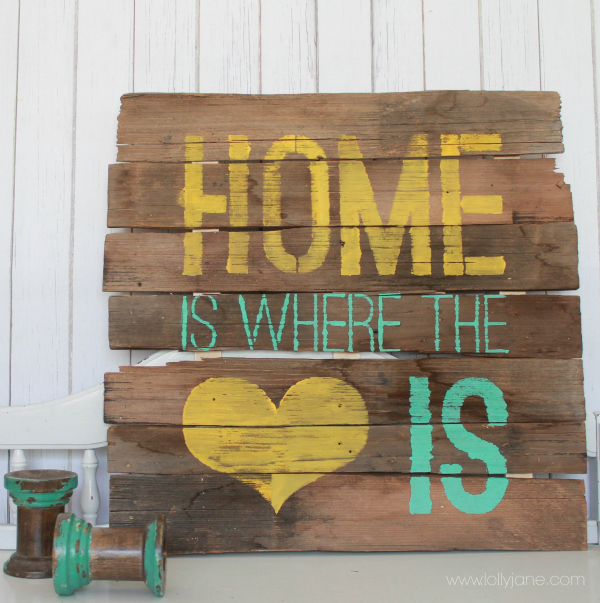I originally wrote and published this article in Spanish.
As we brace ourselves to move abroad for the third time in a few years, I look back and I know that squeezing our lives into a suitcase and leaving our native Barcelona was the best decision that we could have possibly made. Because when you move away, when you turn your life into a journey filled with uncertainty, you grow up in unexpected ways.

You face new challenges, you get to know parts of you you didn’t know existed, you’re amazed at yourself and at the world. You learn, you broaden your horizons. You unlearn, and after coming down and embracing a few lessons, you start growing in humility. You evolve. You feel homesick… and you shape memories that will stay with you forever. If you’ve ever lived away from home or embarked on a long journey, I’m sure you too have felt these 17 things that change forever when you live abroad.
1. Adrenalin becomes part of your life.
From the moment you decide to move abroad, your life turns into a powerful mix of emotions – learning, improvising, dealing with the unexpected… All your senses sharpen up, and for a while the word “routine” is dismissed from your vocabulary to make space for an ever rising adrenalin thrill ride. New places, new habits, new challenges, new people. Starting anew should terrify you, but it’s unusually addictive.
2. But when you go back… everything looks the same.
That’s why, when you get a few days off and fly back home, it strikes you how little everything has changed. Your life’s been changing at a non-stop pace, and you’re on holidays and ready to share all those anecdotes you’ve been piling up. But, at home, life’s the same as ever. Everyone keeps struggling with their daily chores, and it suddenly strikes you: life won’t stop for you.
3. You lack the (and yet you have too many) words.
When someone asks you about your new life, you lack the right words to convey all you’re experiencing. Yet later, in the middle of a random conversation, something reminds you about ‘that time when’…, and you have to hold your tongue because you don’t want to overwhelm everyone with stories from your ‘other country’ and come across as pretentious.

4. You come to understand that courage is overrated.
Lots of people will tell you how brave you are – they too would move abroad if they weren’t so scared. And you, even though you’ve been scared, too, know that courage makes up about 10% of life-changing decisions. The other 90% is purely about wanting it with all your heart. Do you want to do it, do you really feel like doing it? Then do it. From the moment we decide to jump, we’re no longer cowards nor courageous – whatever comes our way, we deal with it.
«It’s a dangerous business, Frodo, going out your door. You step onto the road, and if you don’t keep your feet, there’s no knowing where you might be swept off to.»
5. And, suddenly, you’re free.
You’ve always been free, but freedom feels different now. Now that you’ve given up every comfort and made it work thousands of miles away from home… you feel like you’re capable of anything!

6. You no longer speak one particular language.
Sometimes you unintentionally let a word from another language slip. Other times you can only think of a way of saying something… with that perfect word which, by the way, is in the wrong language. When you interact with a foreign language on a daily basis, you learn and unlearn at the same time. All the while you’re soaking up cultural references and swear words in your second language, you find yourself reading in your mother tongue so it won’t get rusty. Like that time when Homer took a home winemaking course and forgot how to drive.
7. You learn to say goodbye… and to enjoy yourself.
You soon realize that now, most things and people in your life are just passing through, and you instinctively play down the importance of most situations. You perfect the right balance between bonding and letting go – a perpetual battle between nostalgia and pragmatism.
8. You have two of everything.
Two SIM cards (one of them packed with phone numbers from all over the world), two library cards, two bank accounts… And two types of coins, which always end up mysteriously mixing when you’re about to pay for something.
9. Normal? What’s normal?
Living abroad, like traveling, makes you realise that ‘normal’ only means socially or culturally accepted. When you plunge into a different culture and a different society, your notion of normality soon falls apart. You learn there are other ways of doing things, and after a while, you too take to that habit you never thought you’d embrace. You also get to know yourself a little better, because you discover that some things you really believe in, while others are just a cultural heritage of the society you grew up in.
10. You become a tourist in your own city.
That tourist trap you may not have visited in your country only adds up to the never-ending list of things to do in your new home, and you soon become quite the expert on your new city. But when someone comes over for a few days and asks for some suggestions, you find it really hard to recommend but a few things – if it were up to you, you’d recommend visiting everything!

11. You learn how to be patient… and how to ask for help.
When you live abroad, the simplest task can become a huge challenge. Processing paperwork, finding the right word, knowing which bus to take. There’s always moments of distress, but you’re soon filled with more patience than you ever knew you had in you, and accept that asking for help is not only inevitable, but also a very healthy habit.
12. Time is measured in tiny little moments.
It’s as if you were looking through the car window – everything moves really slowly at the back, in the distance, while in front of you life passes by at full speed. On the one hand, you receive news from home – birthdays you missed, people who left without you getting the chance to say goodbye one last time, celebrations you won’t be able to attend. On the other hand, in your new home life goes by at top speed. Time is so distorted now, that you learn how to measure it in tiny little moments, either a Skype call with your family and old friends or a pint with the new ones.
13. Nostalgia strikes when you least expect it.
A food, a song, a smell. The smallest trifle can overwhelm you with homesickness. You miss those little things you never thought you’d miss, and you’d give anything to go back to that place, even if it were just for an instant. Or to share that feeling with someone who’d understand you…
14. But you know it’s not where, but when and how.
Although deep down, you know you don’t miss a place, but a strange and magical conjunction of the right place, the right moment and the right people. That year when you traveled, when you shared your life with special ones, when you were so happy. There’s a tiny bit of who you were scattered among all the places you’ve lived in, but sometimes going back to that place is not enough to stop missing it.

15. You change.
I’m sure you’ve heard about life-changing trips. Well, they’re not a commonplace – living abroad is a trip that will profoundly change your life and who you are. It will shake up your roots, your certainties and your fears. Living in Edinburgh changed us forever in many ways, and if it weren’t for that experience, we probably wouldn’t be about to embark on our next life adventure right now. Maybe you won’t realise it, or even believe it, before you do it. But after some time, one day you’ll see it crystal clear. You’ve evolved, you’ve got scars, you’ve lived. You’ve changed.
16. You fit your home into a suitcase.
From the moment you squeeze your life into a suitcase (or, if you’re lucky with your airline, two), whatever you thought ‘home’ was doesn’t exist anymore. Almost anything you can touch can be replaced – wherever you travel, you’ll end up stockpiling new clothes, new books, new mugs. But there will come a day when you’ll suddenly feel at home in your new city. Home is the person traveling with you, the people you leave behind, the streets where your life takes place. Home is also the random stuff in your new flat, those things you’ll get rid of in the blink of an eye when the time to leave comes. Home is all those memories, all those long-distance calls with your family and friends, a bunch of pictures. Home is where the heart is.

17. And… there’s no turning back.
Now you know what it means to give up comfort, what starting from scratch and marveling at the world every day feels like. And it being such a huge, endless world… How could you choose not to keep traveling and discovering it?
Have you ever lived abroad? Is there anything you would add to this list? Drop us a comment and tell us about your experience!
I originally published this article in Spanish a few weeks ago. Lots of people asked for an English version, but please bear in mind English is not my native language and this is only a humble attempt at a translation. I apologise in advance for any mistakes – if there’s anything you’d like to point out, please drop me a comment below. Thank you! Angie
ORGANIZA TU VIAJE
ATRACCIONES
Ahorra en Edimburgo con el billete Royal Edinburgh
AEROPUERTO
Reserva el bus del aeropuerto al centro de Edimburgo
TOURS EN ESPAÑOL
- Disfruta de la visita guiada al Castillo de Edimburgo
- Reserva el Tour gratis por Edimburgo
- Reserva el Tour gratis de Harry Potter y Edimburgo
EXCURSIONES POR ESCOCIA
Reserva las más populares:
SEGURO DE VIAJE
Imprescindible. Nosotros siempre usamos el de Heymondo con un 5 % de descuento para viajar en cualquier fecha (15 % para familias).
Paga en £
Nuestra tarjeta favorita para viajar y ahorrar comisiones es Revolut, que ofrece 10 € de bienvenida aquí.
INTERNET UK
Compra una tarjeta con datos ilimitados y conéctate desde el primer minuto con un 5 % de descuento.
HOTELES
Consigue las mejores ofertas reservando hotel en Edimburgo con antelación.










What a beautiful article. I have wondered in my mind so many times how to explain this experience…you have covered it all!!!
Hola Angie , I really loved your article. I can so relate with you my housemate ( who is spanish by the way ) and I are always reminiscing days of our goold old past . But at the same time I see her growing and overcoming her fears and same for me , maybe a while ago I wouldntve stayed with anybody other than Indian but I bucked up and took this challenge, I cannot say how new challenges that you take make your life more interesting/sweet/sour , the trick is to just surprise yourself. So what I have now adopted is to say yes to all those things to which I say “No” to instantly. Its a challenge in the beginning but it just makes my life colorful ! Thank you for such a nice article, keep writing !
I lived abroad for 34 years, first roaming through Europe then 28 years in the US. No.18 for me would be food! I love cooking and missed Birds custard powder to make trifle for boxing day – ok, I could have made real custard with eggs etc. but the taste is different. And Bovril, ribena!
It is a pity that when we return home, our friends and family cannot appreciate, or sometimes are not interested, in the experiences that have enriched our lives. I also learnt to know who I am.
Well done on this article.
Gee whiz, I can identify to all of the above. Especially when you mentioned; Life experiences & not wanting to sound pretentious so you keep quiet, this happens to me so often yet I could share quite a few of life experiences but I feel as if people will think ‘well you’re not in NZ now’ & keep a still tongue, but I really feel I want to share the values of the other country. I spent my youth in the UK until I was 19 & then spent 33 years in NZ, had my 3 children in NZ & then at the age of 52 I moved back to the UK, during the 33 years of being away I have travelled back & forth each time thinking where would I rather be? I still don’t know! Torn between to two countries & cultures, I think I must be a bit of a Gypsy at heart. By the way….Great article, thoroughly enjoyed reading it & I can identify with all of the above. Thanks.
Don’t you also feel like you’re a different person in each new city/country you live in? I find it really difficult to find the right balance between being your authentic self and trying to fit into a new culture, especially if the cultures are similar (e.g. two westernised countries). I tried taking a friend back to my home country and they said I was behaving differently and it was hard for them to follow.
I often feel like a a foreigner in my own country. I have lived in Kenya, South Africa, South Korea, Germany, Belgium and England and have traveled to every continent except Antarctica. I miss having the opportunities to meet new friends and traveling from wherever I have lived. Back in the States, most people are not open to meeting new people and most do not understand why I would want to live somewhere other than the US. I feel so lucky to have lived and worked in so many different countries and learning about their cultures and having a circle of friends from all over the world.
Es originamente en Espanol? Que bueno! Mi lingua originalemente es Ingles, y yo tenia ni idea! =)
Congratulations on your English translation! You’ve expressed yourself perfectly – better than many native English speakers could! I’m English, have lived in England all my life, with the exception of 8 years I spent in Turkey. I am able to relate to every point you’ve covered and I feel so privileged to have had the experience from which I benefited in so many ways, I was almost 50 when I started my life in another country, and that, of course, is exactly what it was: starting a new life. My only regret is that I wasn’t much younger when I did it, but better late than never; I returned to England a different person with a changed outlook on life, which just goes to prove that we’re never to old to learn! As a result of the experience, however, I do often feel homesick for that other country and even though I’ve been back in England for 5 years I still find myself lapsing into much-used Turkish phrases on occasions. Thank you so much for your article.
My parents and I migrated from the Netherlands, when I was 12, in 1956. Apart from some extra streets, in Gouda, each of the five times that I have been back, I’ve felt perfectly at home and, as is the case with the majority, I believe, I could not live there permanently again, but very much enjoy that familiar atmosphere. The more interesting seasons. I know that I speak it with a strong accent now but I am so pleased that I retained my Dutch (12 year-old’s vocabulary) completely.
How about “patriotism”? It seems when I am in my country and a local talks badly about foreign or domestic policy, I don’t mind. But when I’m living abroad and someone from another country comments on US issues, I get defensive. It is kind of like when someone talks badly about my family – only I can do that!
Even stranger: it starts happening both ways! As a Belgian living in the US, I get defensive if Americans criticize Belgium, and get equally annoyed when Belgians criticize the US (which honestly happens more often than the opposite)…I completely relate to your comment Phillip